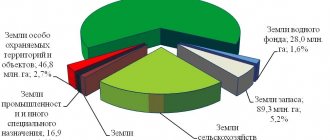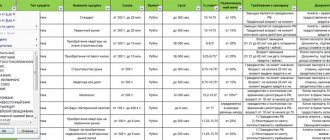Encumbrances on land
When purchasing a plot of land, experts do not recommend immediately drawing up a purchase and sale agreement. There is a possibility that the land has some restrictions on its use, which in legal terms are called encumbrances. Let's figure out what restrictions can be imposed on a land plot and what consequences they entail for the owner of the plot.
The encumbrance of a land plot is a restriction of the owner in his right to use and dispose of the land that belongs to him. It may include the following:
- restrictions on the possibility of use (for example, a ban on placing industrial facilities in protected zones);
- the obligation to make land available for limited use by other people or organizations (easement);
- restrictions on the right of ownership and disposal (mortgage, arrest, etc.).
Encumbrances may be imposed by law or regulation, by agreement (mortgage, lease, etc.) or by court order (public easement, lien, etc.).
According to Article 1 of the Town Planning Code of the Russian Federation, zones with special conditions for the use of territories include security, sanitary protection zones, zones for the protection of objects of cultural heritage of the peoples of the Russian Federation, water protection zones and other zones established in accordance with the legislation of the Russian Federation. Among other things, there may be encumbrances associated with real estate objects located on it that have the status of cultural monuments.
as encumbrances on a land plot in Russian legislation:
- easement;
- mortgage;
- rent;
- arrest.
An easement is a limited right of use that another person acquires in relation to someone else’s land plot. Typically, such an encumbrance is imposed to ensure access to the property.
Another example of an encumbrance is a mortgage. The subject of a mortgage can be not only ownership, but also long-term lease.
Of the lease agreements, those that are designed for a year or more are subject to registration as an encumbrance. Lease does not prevent the owner from making transactions with the site, and when purchasing it, the new owner may find a tenant on the site. However, this should not result in termination of the contract.
Finally, a fairly common type of restriction is the seizure of a land plot. Any transactions related to the sale, donation or other disposal of this land will be prohibited and will not be able to register with Rosreestr.
Restrictions imposed on land are subject to mandatory registration along with ownership rights. Rosreestr authorities make appropriate entries in the Unified State Register.
The best option, if in doubt, is to contact the offices for receiving and issuing documents for the provision of public services of Rosreestr or multifunctional centers (MFC) and order an extract for the area you are interested in.
You can check a land plot for the presence of encumbrances without contacting the reception offices or MFC directly. Today, on the Rosreestr website (rosreestr.ru), it is possible to obtain reference information on a real estate property by its address or cadastral number.
Code of the Russian Federation dated October 25, 2001 No. 136-FZ
RUSSIAN FEDERATION
Land Code of the Russian Federation
Adopted by the State Duma on September 28, 2001
Approved by the Federation Council on October 10, 2001
(As amended by federal laws dated June 30, 2003 No. 86-FZ, dated June 29, 2004 No. 58-FZ, dated October 3, 2004 No. 123-FZ, dated December 21, 2004 No. 172-FZ, dated December 29, 2004 No. 189-FZ, dated December 29, 2004 No. 191-FZ, dated March 7, 2005 No. 15-FZ, dated July 21, 2005 No. 111-FZ, dated July 22, 2005 No. 117-FZ, dated December 31, 2005 No. 206-FZ, dated April 17, 2006 No. 53-FZ, dated 06/03/2006 No. 73-FZ, dated 06/30/2006 No. 92-FZ, dated 06/30/2006 No. 93-FZ, dated 07/27/2006 No. 154-FZ, dated 10/16/2006 No. 160-FZ, dated 04.12.2006 No. 201-FZ, dated 04.12.2006 No. 204-FZ, dated 12.18.2006 No. 232-FZ, dated 29.12.2006 No. 260-FZ, dated 29.12.2006 No. 261-FZ, dated 28.02.2007 No. 21 -FZ, dated 10.05.2007 No. 69-FZ, dated 19.06.2007 No. 102-FZ, dated 24.07.2007 No. 212-FZ, dated 30.10.2007 No. 240-FZ, dated 08.11.2007 No. 257-FZ, dated 13.05 .2008 No. 66-FZ, dated May 13, 2008 No. 68-FZ, dated July 14, 2008 No. 118-FZ, dated July 22, 2008 No. 141-FZ, dated July 23, 2008 No. 160-FZ, dated December 25, 2008 No. 281- Federal Law, dated December 30, 2008 No. 311-FZ, dated March 14, 2009 No. 32-FZ, dated July 17, 2009 No. 145-FZ, dated July 17, 2009 No. 164-FZ, dated July 24, 2009 No. 209-FZ, dated December 25. 2009 No. 340-FZ, dated December 27, 2009 No. 343-FZ, dated December 27, 2009 No. 365-FZ, dated July 22, 2010 No. 167-FZ, dated December 29, 2010 No. 435-FZ, dated December 29, 2010 No. 442-FZ , dated 03/20/2011 No. 41-FZ, dated 04/05/2011 No. 56-FZ, dated 06/14/2011 No. 138-FZ, dated 07/01/2011 No. 169-FZ, dated 07/11/2011 No. 193-FZ, dated 07/18/2011 No. 214-FZ, dated July 18, 2011 No. 215-FZ, dated July 18, 2011 No. 219-FZ, dated July 18, 2011 No. 242-FZ, dated July 19, 2011 No. 246-FZ, dated July 21, 2011 No. 257-FZ, dated 21.11.2011 No. 331-FZ, dated 30.11.2011 No. 349-FZ, dated 30.11.2011 No. 365-FZ, dated 06.12.2011 No. 401-FZ, dated 07.12.2011 No. 417-FZ, dated 08.12.2011 No. 423-FZ, dated December 8, 2011 No. 424-FZ, dated December 12, 2011 No. 425-FZ, dated December 12, 2011 No. 427-FZ, dated June 25, 2012 No. 93-FZ, dated July 28, 2012 No. 133-FZ, dated 12/30/2012 No. 318-FZ, dated 03/04/2013 No. 21-FZ, dated 04/05/2013 No. 55-FZ, dated 06/07/2013 No. 123-FZ, dated 07/02/2013 No. 148-FZ, dated 07/02/2013 No. 185 -FZ, dated July 23, 2013 No. 247-FZ, dated December 28, 2013 No. 396-FZ, dated December 28, 2013 No. 406-FZ, dated December 28, 2013 No. 411-FZ, dated December 28, 2013 No. 446-FZ, dated June 23 .2014 No. 171-FZ, dated July 21, 2014 No. 217-FZ, dated July 21, 2014 No. 224-FZ, dated July 21, 2014 No. 234-FZ, dated October 22, 2014 No. 315-FZ, dated December 29, 2014 No. 458- Federal Law, dated December 29, 2014 No. 485-FZ, dated December 29, 2014 No. 487-FZ, dated December 31, 2014 No. 499-FZ, dated March 8, 2015 No. 48-FZ, dated April 20, 2015 No. 102-FZ, dated June 29. 2015 No. 206-FZ, dated July 13, 2015 No. 213-FZ, dated July 13, 2015 No. 224-FZ, dated July 13, 2015 No. 233-FZ, dated July 13, 2015 No. 252-FZ, dated October 5, 2015 No. 277-FZ , dated November 28, 2015 No. 357-FZ, dated December 30, 2015 No. 431-FZ, dated December 30, 2015 No. 460-FZ, dated May 1, 2016 No. 119-FZ, dated May 23, 2016 No. 149-FZ, dated June 23, 2016 No. 206-FZ, dated 06/23/2016 No. 221-FZ, dated 07/03/2016 No. 334-FZ, dated 07/03/2016 No. 335-FZ, dated 07/03/2016 No. 336-FZ, dated 07/03/2016 No. 349-FZ, dated 07/03/2016 No. 354-FZ, dated 07/03/2016 No. 361-FZ, dated 07/03/2016 No. 365-FZ, dated 07/03/2016 No. 373-FZ, dated 07/01/2017 No. 141-FZ, dated 07/01/2017 No. 143-FZ, dated July 18, 2017 No. 177-FZ, dated July 29, 2017 No. 216-FZ, dated July 29, 2017 No. 217-FZ, dated July 29, 2017 No. 280-FZ, dated December 31, 2017 No. 506-FZ, dated 12/31/2017 No. 507-FZ, dated 06/27/2018 No. 164-FZ, dated 06/29/2018 No. 171-FZ, dated 07/01/2018 No. 175-FZ, dated 07/03/2018 No. 185-FZ, dated 07/19/2018 No. 212 -FZ, dated 03.08.2018 No. 340-FZ, dated 03.08.2018 No. 341-FZ, dated 03.08.2018 No. 342-FZ, dated 12.18.2018 No. 471-FZ, dated 25.12.2018 No. 485-FZ, dated 27.06 .2019 No. 151-FZ, dated 08/02/2019 No. 283-FZ, dated 12/27/2019 No. 477-FZ, dated 12/27/2019 No. 502-FZ, dated 03/18/2020 No. 66-FZ, dated 07/13/2020 No. 194- Federal Law, dated July 13, 2020 No. 202-FZ, dated July 31, 2020 No. 269-FZ, dated October 15, 2020 No. 318-FZ, dated December 22, 2020 No. 435-FZ, dated December 30, 2020 No. 494-FZ, dated December 30. 2020 No. 505-FZ, dated 04/05/2021 No. 79-FZ, dated 04/20/2021 No. 92-FZ, dated 04/30/2021 No. 113-FZ, dated 04/30/2021 No. 120-FZ, dated 06/11/2021 No. 163-FZ , dated 06/11/2021 No. 170-FZ, dated 06/11/2021 No. 209-FZ, dated 06/28/2021 No. 226-FZ, dated 07/01/2021 No. 273-FZ, dated 07/01/2021 No. 276-FZ, dated 07/02/2021 No. 300-FZ, dated 07/02/2021 No. 302-FZ, dated 12/06/2021 No. 407-FZ, dated 12/06/2021 No. 408-FZ)
CHAPTER I. GENERAL PROVISIONS
Article 1. Basic principles of land legislation
1. This Code and other acts of land legislation issued in accordance with it are based on the following principles:
1) taking into account the importance of land as the basis of human life and activity, according to which the regulation of relations on the use and protection of land is carried out on the basis of ideas about land as a natural object, protected as the most important component of nature, a natural resource used as a means of production in agriculture economy and forestry and the basis for carrying out economic and other activities on the territory of the Russian Federation, and at the same time as about real estate, about the object of ownership and other rights to land;
2) the priority of protecting land as the most important component of the environment and a means of production in agriculture and forestry over the use of land as real estate, according to which the ownership, use and disposal of land are carried out by the owners of land plots freely, if this does not cause damage to the environment;
3) the priority of protecting human life and health, according to which, when carrying out activities on the use and protection of land, such decisions must be made and such types of activities carried out that would ensure the preservation of human life or prevent negative (harmful) effects on human health, even if this will require large expenses;
4) participation of citizens, public organizations (associations) and religious organizations in resolving issues relating to their rights to land, according to which citizens of the Russian Federation, public organizations (associations) and religious organizations have the right to take part in the preparation of decisions, the implementation of which may have an impact on the condition of lands during their use and protection, and state authorities, local governments, economic and other entities are obliged to ensure the possibility of such participation in the manner and in the forms established by law; (As amended by Federal Law dated October 3, 2004 No. 123-FZ)
5) the unity of fate of land plots and objects firmly associated with them, according to which all objects firmly associated with land plots follow the fate of land plots, with the exception of cases established by federal laws;
6) the priority of preserving especially valuable lands and lands of specially protected areas, according to which a change in the intended purpose of valuable agricultural lands, lands occupied by protective forests, lands of specially protected natural territories and objects, lands occupied by cultural heritage sites, other especially valuable lands and lands specially protected areas for other purposes is limited or prohibited in the manner established by federal laws. The establishment of this principle should not be interpreted as denying or belittling the importance of lands of other categories; (As amended by federal laws dated December 21, 2004 No. 172-FZ; dated December 4, 2006 No. 201-FZ)
7) paid use of land, according to which any use of land is carried out for a fee, except for cases established by federal laws and laws of constituent entities of the Russian Federation;
division of lands according to their intended purpose into categories, according to which the legal regime of lands is determined based on their belonging to a certain category and permitted use in accordance with zoning of territories and legal requirements; (As amended by Federal Law No. 141-FZ dated July 22, 2008)
9) delimitation of state ownership of land into property of the Russian Federation, property of constituent entities of the Russian Federation and property of municipalities, according to which the legal basis and procedure for such delimitation are established by federal laws;
10) a differentiated approach to establishing the legal regime of lands, according to which natural, social, economic and other factors must be taken into account when determining their legal regime;
11) a combination of the interests of society and the legitimate interests of citizens, according to which the regulation of the use and protection of land is carried out in the interests of the entire society while ensuring guarantees for each citizen for the free possession, use and disposal of the land plot belonging to him.
When regulating land relations, the principle of differentiating the operation of the norms of civil legislation and the norms of land legislation is applied in terms of regulating relations on the use of land, as well as the principle of state regulation of land privatization.
2. Federal laws may establish other principles of land legislation that do not contradict the principles established in paragraph 1 of this article.
Article 2. Land legislation
1. Land legislation in accordance with the Constitution of the Russian Federation is under the joint jurisdiction of the Russian Federation and the constituent entities of the Russian Federation. Land legislation consists of this Code, federal laws and laws of the constituent entities of the Russian Federation adopted in accordance with them.
The norms of land law contained in other federal laws and laws of the constituent entities of the Russian Federation must comply with this Code.
Land relations can also be regulated by decrees of the President of the Russian Federation, which should not contradict this Code or federal laws.
2. The Government of the Russian Federation makes decisions regulating land relations within the powers determined by this Code, federal laws, as well as decrees of the President of the Russian Federation regulating land relations.
3. On the basis of and in pursuance of this Code, federal laws, other regulatory legal acts of the Russian Federation, laws of the constituent entities of the Russian Federation, executive authorities of the constituent entities of the Russian Federation, within the limits of their powers, can issue acts containing norms of land law.
4. On the basis of and in pursuance of this Code, federal laws, other regulatory legal acts of the Russian Federation, laws and other regulatory legal acts of the constituent entities of the Russian Federation, local government bodies, within the limits of their powers, may issue acts containing norms of land law.
Article 3. Relations regulated by land legislation
1. Land legislation regulates relations regarding the use and protection of lands in the Russian Federation as the basis for the life and activities of the peoples living in the relevant territory (land relations).
2. To relations regarding the use and protection of subsoil, water bodies, forests, wildlife and other natural resources, environmental protection, protection of specially protected natural areas and objects, protection of atmospheric air and protection of objects of cultural heritage of the peoples of the Russian Federation, the legislation on subsoil is applied accordingly , forestry, water legislation, legislation on wildlife, on the protection and use of other natural resources, on environmental protection, on the protection of atmospheric air, on specially protected natural areas and objects, on the protection of cultural heritage sites of the peoples of the Russian Federation, special federal laws. (As amended by Federal Law No. 118-FZ dated July 14, 2008)
The norms of these branches of legislation apply to land relations if these relations are not regulated by land legislation.
3. Property relations regarding the ownership, use and disposal of land plots, as well as transactions with them, are regulated by civil legislation, unless otherwise provided by land, forestry, water legislation, legislation on subsoil, on environmental protection, and special federal laws.
Article 4. Application of international treaties of the Russian Federation
1. If an international treaty of the Russian Federation, ratified in the prescribed manner, establishes rules other than those provided for by this Code, the rules of the international treaty apply. (As amended by Federal Law No. 113-FZ dated April 30, 2021)
2. It is not permitted to apply the rules of international treaties of the Russian Federation in their interpretation that is contrary to the Constitution of the Russian Federation. Such a contradiction may be established in the manner prescribed by federal constitutional law. (Clause introduced - Federal Law dated April 30, 2021 No. 113-FZ)
Article 5. Participants in land relations
1. Participants in land relations are citizens, legal entities, the Russian Federation, constituent entities of the Russian Federation, and municipalities.
2. The rights of foreign citizens, stateless persons and foreign legal entities to acquire ownership of land plots are determined in accordance with this Code and federal laws.
3. For the purposes of this Code, the following concepts and definitions are used:
owners of land plots - persons who are the owners of land plots;
land users - persons who own and use land plots on the right of permanent (perpetual) use or on the right of free use; (As amended by Federal Law No. 48-FZ dated 03/08/2015)
landowners - persons who own and use land plots on the right of lifelong inheritable ownership;
tenants of land plots - persons who own and use land plots under a lease agreement or sublease agreement;
easement holders - persons who have the right to limited use of other people's land plots (easement);
legal holders of land plots - owners of land plots, land users, land owners and tenants of land plots; (Paragraph introduced - Federal Law dated December 31, 2014 No. 499-FZ)
holders of public easement - persons who have the right to limited use of lands and (or) other people's land plots, established in accordance with Chapter V7 of this Code. (Paragraph introduced - Federal Law dated 03.08.2018 No. 341-FZ)
Article 6. Objects of land relations
1. The objects of land relations are:
1) land as a natural object and natural resource;
2) land plots;
3) parts of land plots.
2. (Clause has lost force - Federal Law dated July 22, 2008 No. 141-FZ)
3. A land plot as an object of ownership and other rights to land provided for by this Code is an immovable thing that represents a part of the earth’s surface and has characteristics that make it possible to define it as an individually defined thing. In cases and in the manner established by federal law, artificial land plots may be created. (Clause introduced - Federal Law dated June 23, 2014 No. 171-FZ)
Article 7. Composition of lands in the Russian Federation
1. Land in the Russian Federation according to its intended purpose is divided into the following categories:
1) agricultural land;
2) lands of settlements; (As amended by Federal Law No. 232-FZ dated December 18, 2006)
3) lands of industry, energy, transport, communications, radio broadcasting, television, computer science, lands for space activities, lands of defense, security and lands of other special purposes;
4) lands of specially protected areas and objects;
5) forest lands;
6) lands of the water fund;
7) reserve lands.
2. The lands specified in paragraph 1 of this article are used in accordance with the intended purpose established for them. The legal regime of lands is determined based on their belonging to a particular category and permitted use in accordance with the zoning of territories, the general principles and procedure for which are established by federal laws and the requirements of special federal laws.
Any type of permitted use from the types provided for by zoning of territories is chosen independently, without additional permits and approval procedures.
Types of permitted use of land plots are determined in accordance with the classifier approved by the federal executive body exercising the functions of developing state policy and legal regulation in the field of land relations. (Paragraph introduced - Federal Law dated July 22, 2010 No. 167-FZ)
3. In places of traditional residence and traditional economic activity of indigenous peoples of the Russian Federation and representatives of other ethnic communities, in cases provided for by federal laws, laws and other regulatory legal acts of constituent entities of the Russian Federation, regulatory legal acts of local government bodies, a special legal regime may be established use of lands of these categories. (As amended by Federal Law No. 164-FZ dated June 27, 2018)
Article 8. Assigning lands to categories, transferring them from one category to another
1. The transfer of land from one category to another is carried out in relation to: (As amended by Federal Law No. 141-FZ of July 22, 2008)
1) lands in federal ownership - by the Government of the Russian Federation;
2) lands owned by the constituent entities of the Russian Federation and agricultural lands owned by municipalities - by executive authorities of the constituent entities of the Russian Federation;
3) lands in municipal ownership, with the exception of agricultural lands, by local government bodies;
4) privately owned lands:
agricultural lands - by executive authorities of the constituent entities of the Russian Federation;
lands for other special purposes - by local government bodies.
The transfer of lands of settlements to lands of other categories and lands of other categories to lands of settlements, regardless of their forms of ownership, is carried out by establishing or changing the boundaries of settlements in the manner established by this Code and the legislation of the Russian Federation on urban planning activities. (Paragraph introduced - Federal Law dated July 21, 2005 No. 111-FZ; as amended by Federal Law dated December 18, 2006 No. 232-FZ)
(Paragraph introduced - Federal Law dated October 30, 2007 No. 240-FZ; repealed - Federal Law dated March 4, 2013 No. 21-FZ)
The procedure for transferring land from one category to another is established by federal laws.
2. The category of land is indicated in:
1) acts of federal executive authorities, acts of executive authorities of constituent entities of the Russian Federation and acts of local government bodies on the provision of land plots;
2) agreements the subject of which are land plots;
3) state real estate cadastre; (As amended by Federal Law No. 66-FZ dated May 13, 2008)
4) documents on state registration of rights to real estate and transactions with it;
5) other documents in cases established by federal laws and laws of constituent entities of the Russian Federation.
3. Violation of the procedure for transferring lands from one category to another established by this Code and federal laws is the basis for invalidating acts on assigning lands to categories, on transferring them from one category to another.
Article 9. Powers of the Russian Federation in the field of land relations
1. The powers of the Russian Federation in the field of land relations include:
1) establishing the foundations of the federal
Article 23. “Land Code of the Russian Federation” dated October 25, 2001 N 136-FZ (as amended on December 6, 2021)
Article 23. The right to limited use of someone else’s land plot (easement, public easement)
1. An easement is established in accordance with civil legislation, and in relation to a land plot located in state or municipal ownership, taking into account the features provided for in Chapter V.3 of this Code.
2. An easement may be established by a decision of an executive body of state power or a local government body in order to meet state or municipal needs, as well as the needs of the local population, without the withdrawal of land plots (public easement).
3. A public easement is established in accordance with this Code. The provisions of the Civil Code of the Russian Federation on easements and the provisions of Chapter V.3 of this Code do not apply to legal relations arising in connection with the establishment, implementation and termination of a public easement.
4. A public easement may be established for:
1) passage or passage through a land plot, including for the purpose of ensuring free access of citizens to a public water body and its shoreline;
2) placement on the land plot of boundary signs, geodetic points of state geodetic networks, gravimetric points, leveling points and entrances to them;
3) carrying out drainage and reclamation work on the land plot;
4) intake (withdrawal) of water resources from water bodies and watering places;
5) driving farm animals through the land plot;
6) haymaking, grazing of farm animals in the prescribed manner on land plots at a time the duration of which corresponds to local conditions and customs;
7) use of the land plot for the purposes of hunting, fishing, aquaculture (fish farming);
use of the land plot for the purposes provided for in Article 39.37 of this Code.
5. A public easement may be established in relation to one or more land plots and (or) lands.
Encumbering a land plot with an easement or public easement does not deprive the owner of such a land plot of the rights of ownership, use and (or) disposal of such a land plot.
6. The transfer of rights to a land plot encumbered with a public easement, the provision of a land plot encumbered with a public easement, which is in state or municipal ownership, to citizens or legal entities are not grounds for terminating a public easement and (or) changing the conditions for its implementation.
7. The term of the easement is determined by agreement of the parties. The term of the easement in relation to a land plot located in state or municipal ownership is determined taking into account the restrictions provided for in paragraph 4 of Article 39.24 of this Code.
The duration of a public easement is determined by the decision on its establishment.
The term of an easement, the term of a public easement in relation to a land plot located within the boundaries of lands reserved for state or municipal needs, cannot exceed the period of reservation of such lands.
8. Easement, public easement must be established and implemented under conditions that are least burdensome for the use of the land plot in accordance with its intended purpose and permitted use.
9. The establishment of easement, public easement in relation to lands and land plots from agricultural lands is carried out taking into account the requirements for ensuring the rational use of land.
10. If the placement of an object specified in subparagraph 1 of Article 39.37 of this Code on a land plot will lead to the impossibility of using the land plot in accordance with its permitted use or significant difficulties in its use for a period exceeding the period provided for in subparagraph 4 of paragraph 1 of Article 39.44 of this Code, the placement of the specified structure on a land plot owned by a citizen or legal entity is not carried out under the terms of a public easement. In this case, the placement of the specified structure can be carried out after the seizure of the land plot for state or municipal needs, subject to the conditions provided for in Articles 49 and 56.3 of this Code.
11. The activity for which an easement or public easement is established may be carried out on a land plot regardless of its intended purpose and permitted use, except for cases where the implementation of this activity is not allowed within the boundaries of certain zones, lands and territories in accordance with their regime .
12. The right holder of a land plot encumbered with an easement has the right to demand a proportionate payment from the persons in whose interests the easement is established, unless otherwise provided by this Code or federal law.
13. In the event that the establishment of a public easement leads to significant difficulties in the use of a land plot, its right holder has the right to demand from the state authority or local government body that established the public easement a proportionate fee, unless otherwise provided by this Code.
14. Persons whose rights and legitimate interests are affected by the establishment of a public easement may protect their rights in court.
15. The absence in the Unified State Register of Real Estate of information about registered rights to land plots encumbered by a public easement and (or) about the coordinates of characteristic points of the boundaries of such land plots, the presence of disputes about the rights to such land plots are not an obstacle to the establishment of a public easement.
16. The presence of an encumbrance on a land plot is not an obstacle to the establishment of a public easement in relation to such a land plot, except for cases where previously established restrictions on the rights to a land plot, a public easement do not allow the implementation of activities for which a public easement is established.
17. Easements are subject to state registration in accordance with the Federal Law “On State Registration of Real Estate”, with the exception of easements provided for in paragraph 4 of Article 39.25 of this Code. Information about public easements is entered into the Unified State Register of Real Estate.
18. The procedure for establishing a public easement in relation to land plots and (or) lands for their use for the purposes provided for in Article 39.37 of this Code, the term of the public easement, the conditions for its implementation and the procedure for determining the payment for such an easement are established by Chapter V.7 of this Code.
19. The specifics of establishing an easement, a public easement in relation to land plots located within the boundaries of the right of way of highways are established by the Federal Law of November 8, 2007 N 257-FZ “On highways and road activities in the Russian Federation and on amendments to certain legislative acts of the Russian Federation".






